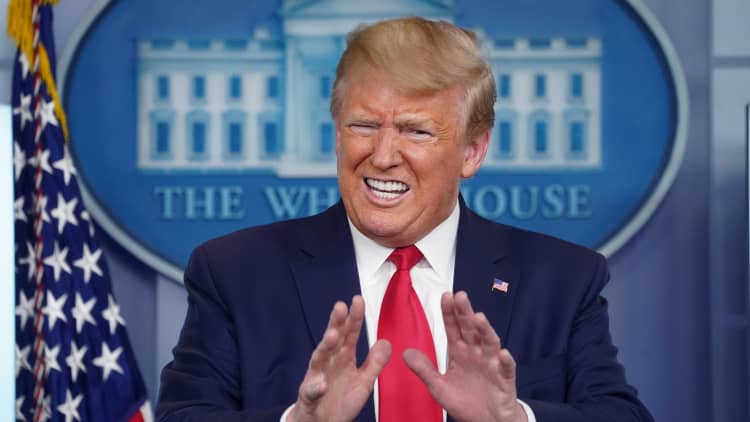
WASHINGTON — President Donald Trump has removed the lead watchdog overseeing the $2 trillion coronavirus package, just days after the official, Glenn Fine, was appointed to the role.
The move came as Trump pursued similar action in recent weeks against independent inspectors general across the federal government.
Fine had been the acting Pentagon inspector general until Monday afternoon, when Trump abruptly removed him from his post.
"Yesterday, the President nominated Mr. Jason Abend for the position of DoD Inspector General," said Dwrena Allen, a spokesperson for the Defense Department's Inspector General, in a statement to CNBC.
"The same day, the President also designated Mr. Sean W. O'Donnell, who is the Environmental Protection Agency Inspector General (EPA IG), to serve as the Acting DoD IG in addition to his current duties at the EPA," Allen said.
"Mr. Fine is no longer on the Pandemic Response Accountability Committee," Allen said, and he now "reverts to his position as the Principal Deputy Inspector General."
Fine had been chosen March 30 to lead the Pandemic Response Accountability Committee by his fellow inspectors general, who were tasked by the new law to select a chairman for their committee.
By removing Fine from his Pentagon job, Trump effectively eliminated Fine from the oversight committee, since only sitting inspectors general can serve on the committee.
Speaking at a press conference Tuesday evening, Trump said he had never met Fine, but suggested he was a Democratic appointee. "We have a lot of IGs from the Obama era, and I left them, largely. But when we have reports of bias, and we have different things coming in."
In fact, Fine was first confirmed by the Senate to be an inspector general in 2000, during the George W. Bush administration. After 11 years at the inspector general of the Justice Department, Fine returned to the private sector in 2011. In 2015, he came back to government as a deputy inspector general for the Pentagon.
Not the first time
The Pandemic Response Accountability Committee is one of two new entities charged with ensuring that the $2 trillion relief and stimulus package is administered responsibly and transparently. The other oversight entity is a dedicated inspector general for the $500 billion corporate bailout fund.
A week before Trump removed Fine from the accountability committee on Monday, he took separate but equally unprecedented steps to undermine the inspector general for the corporate bailout fund.

The position of Special Inspector General for Pandemic Relief, or SIGPR, was created in response to concerns that there would be little transparency as to which companies got the billions in taxpayer funded relief, and why.
As part of their job, the SIGPR is required to deliver independent reports to Congress on how the money is being spent. They are also required to inform Congress if the White House ever tries to block their requests for information about what's happening to the funds.
When Trump signed the $2 trillion package on March 27, he issued what's known as a signing statement, or a declaration of how a president intends to interpret the new law he is signing. In it, Trump wrote that his administration would not be "permitting the [the Inspector General] to issue reports to the Congress without the presidential supervision."
Essentially, Trump was trying to assert control over what the SIGPR would be permitted to report to Congress and what they would not. This undercuts a fundamental part of the SIGPR's job, namely, to ensure that Congress can effectively oversee what the Trump administration is doing with the $500 billion bailout.
Bipartisan pushback
At least one powerful Republican appeared to publicly disagree with Trump's decision to remove Fine shortly after it was first reported. Senate Finance Committee Chairman Chuck Grassley tweeted Tuesday that the president should view inspectors general as assets who help Trump to hold the federal bureaucracy accountable and fulfill his campaign promise to "drain the swamp."
Democrats, however, had much harsher criticism for Trump's decision.
"This is a major problem that I'm very concerned about on a whole series of levels," House Armed Services Committee Chairman Adam Smith, D-Wash., said on a call with reporters Tuesday.
"I think we all understand President Trump, very clear and, frankly, on his first day in office: He wants people who are loyal to him. Who will praise him. First and foremost, that is what he wants in every position that he can control. He's going to try to expand what he can control. Theoretically, IGs are not simply subject to the whims of presidents," Smith said.
"The president is not bringing talent to the challenge. He is bringing suck-ups to the challenge," he added.
Senate Minority Leader Chuck Schumer, D-N.Y., accused Trump of corruptly using the global pandemic to punish honest government employees.
"President Trump is abusing the coronavirus pandemic to eliminate honest and independent public servants because they are willing to speak truth to power and because he is so clearly afraid of strong oversight," Schumer said in a statement after news broke of Fine's removal.
"President Trump's corrupt action to sideline Acting Inspector General Glenn Fine, who was newly-appointed as chair of the Pandemic Response Accountability Committee, only strengthens Democrats' resolve to hold the administration accountable and enforce the multiple strict oversight provisions of the CARES Act," said Schumer.
Trump's war on IGs
Fine's removal is the latest in a series of actions and statements by the president that reflect his growing frustration overall with independent inspectors general.
Trump is known to respond harshly to any perceived dissent or criticism of his administration. The president often views inspectors general, whose job it is to hold agencies accountable, as critics and roadblocks to achieving his policy and political goals.
On Friday, Trump told Congress he was firing the intelligence community's inspector general, Michael Atkinson.
Atkinson is best known as the inspector general who first alerted Congress last year about the existence of a whistleblower complaint related to the president's actions towards Ukraine, specifically that the president was abusing the power of his office to pressure Ukraine into helping him win his reelection campaign.
The complaint sparked a series of events and investigations which culminated in Trump's impeachment.
On Tuesday morning, Trump attacked another inspector general, Principal Deputy Inspector General Christi Grimm at the Department of Health and Human Services.
Grimm recently released a report showing that many hospitals lack crucial supplies needed to fight the coronavirus pandemic, including thermometers and surgical masks.
Asked about the HHS report at Monday afternoon's coronavirus briefing, Trump said, "It's just wrong," but did not provide any evidence to support his claim.
— CNBC's Lauren Hirsch contributed to this report.




